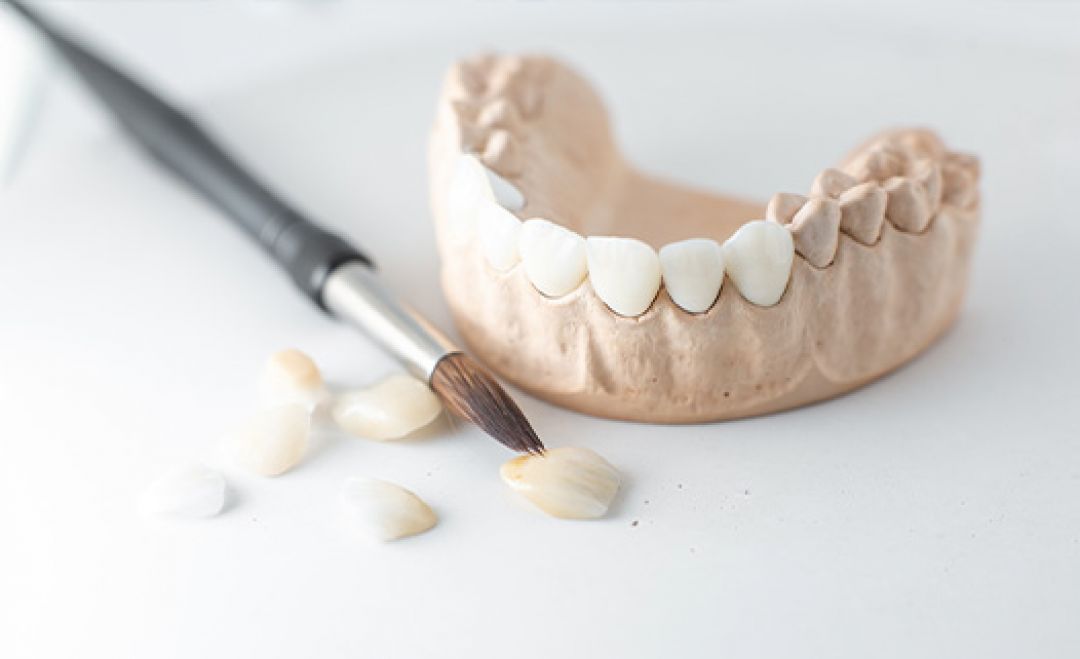Dental Crown
Avarage Time Needed
Anesthesia Type
Average Session Required
Recovery Time

Online Consultation
What Is a Dental Crown?
A dental crown is a custom-made cap placed over a damaged or weakened tooth to restore its strength, shape, and appearance. Crowns are an essential solution when a tooth is compromised by decay, fracture, or extensive wear. They cover the entire visible portion of a tooth, protecting it from further damage and helping maintain proper function.
Dental crowns come in various materials, including porcelain, ceramic, metal, or a combination of these. Porcelain and ceramic crowns are popular for front teeth because they mimic the natural color and translucency of real teeth, offering a seamless, aesthetic look. Metal crowns, often made from gold or other durable alloys, are typically used for molars, where strength and durability are paramount. The choice of material depends on the tooth’s location, the patient’s aesthetic needs, and functional requirements.
The process of getting a dental crown usually involves two main visits. During the first appointment, your dentist prepares the affected tooth by removing a small amount of its structure to ensure a proper fit. An impression of the tooth is then taken to create a crown that precisely matches the natural contours of your smile. In the second visit, the custom-made crown is cemented onto the prepared tooth, restoring its appearance and function.
When Is a Dental Crown Needed?
A tooth crown is necessary in several dental scenarios, including:
- Severe tooth decay that cannot be treated with a simple filling.
- Cracked or fractured teeth that require structural reinforcement.
- Post-root canal protection to prevent further damage.
- Restoration of a worn-down tooth due to grinding (bruxism).
- Support for a dental bridge to replace missing teeth.
- Cosmetic improvements for discolored or misshapen teeth.
What Are the Different Types of Dental Crowns?
Dental crowns are available in several types, each offering unique benefits in terms of durability, aesthetics, and functionality. Below are the most common types of dental crowns:
- Porcelain Crowns: Porcelain crowns are favored for their natural appearance. They mimic the color and translucency of natural teeth, making them an ideal choice for front teeth. They are resistant to staining, providing a long-lasting cosmetic solution.
- All-Ceramic Crowns: Made entirely of ceramic material, these crowns are similar to porcelain crowns but often provide enhanced strength and durability. They are an excellent option for patients with metal allergies and for restoring both front and back teeth.
- Porcelain-Fused-to-Metal (PFM) Crowns: PFM crowns have a metal core covered by a porcelain layer. This combination offers the strength of metal with the aesthetic appeal of porcelain. They are versatile and commonly used on both anterior and posterior teeth.
- Metal Crowns: Constructed from gold, base-metal alloys, or other metals, metal crowns are known for their durability and longevity. They are particularly suited for molars, where chewing forces are strongest. Although they are not tooth-colored, their longevity makes them a reliable choice.
- Zirconia Crowns: Zirconia crowns are made from a robust ceramic material known for its strength and resistance to wear. They offer excellent aesthetics and are often used in cases where high strength is required without compromising on appearance.
How Is a Dental Crown Procedure Performed?
The dental crown procedure typically follows these steps:
- Tooth Preparation: The dentist reshapes the tooth to fit the crown.
- Impression Taking: A mold of the tooth is created for a custom fit.
- Temporary Crown Placement: A temporary crown is fitted until the permanent one is ready.
- Final Crown Placement: The custom-made crown is cemented in place.
For same-day dental crowns, CEREC technology is used to design, create, and fit the crown in a single appointment.
What Should You Expect After Getting a Dental Crown?
After the procedure, patients may experience:
- Mild sensitivity to hot and cold foods for a few days.
- Temporary discomfort while adjusting to the new crown.
- Improved function and aesthetics, restoring normal chewing and speech.
How Long Do Dental Crowns Last?
The lifespan of a crown tooth depends on material, oral hygiene, and habits. On average:
- Porcelain and zirconia crowns: 10–15 years.
- Metal crowns: 15–20 years or longer.
- Resin crowns: 5–7 years.
Proper care can extend the lifespan of crowns for teeth significantly.
What Are the Benefits of Dental Crowns?
Dental crowns offer a variety of benefits that improve both the function and appearance of your teeth. These custom-made caps restore damaged or decayed teeth and protect them from further wear and tear. One of the primary benefits of a dental crown is its ability to reinforce a weakened tooth. When a tooth has been compromised by decay or injury, a crown acts as a protective shield, allowing you to eat and speak comfortably without the risk of additional damage.
Another significant benefit is enhanced aesthetics. Modern crowns are designed to match the natural color, shape, and size of your teeth. Porcelain or ceramic crowns, for example, are highly favored for front teeth because they create a seamless, natural look. They can transform a smile by covering imperfections such as discoloration, chips, or minor misalignments.
Dental crowns are also versatile in their application. They are frequently used after root canal treatments to strengthen a tooth that has been compromised by infection. In addition, crowns can serve as anchors for dental bridges, providing stability and support for adjacent restorations.
Dental crowns offer long-term durability. With proper care and regular dental check-ups, crowns can last for many years, making them a cost-effective investment in your dental health. They protect your natural teeth from further damage, reduce sensitivity, and help maintain overall oral health. In summary, dental crowns not only safeguard and restore teeth but also enhance your smile, boosting your confidence and quality of life.
Are There Any Risks or Complications with Dental Crowns?
While dental crowns are generally safe, potential issues include:
- Tooth sensitivity after placement.
- Crown loosening or falling off.
- Allergic reactions to metal components.
- Gum irritation if the crown does not fit properly.
How Much Do Dental Crowns Cost?
The cost of dental crowns at Denthub varies depending on the type of crown you choose and the condition of your tooth. A porcelain-fused-to-metal (PFM) crown typically starts around £265, while a full ceramic crown (often made of advanced materials like E-max or zirconia) may cost £425 or more. Metal crowns, which are less common for visible teeth but still used on back teeth, can sometimes be more affordable. Each material has its own advantages. For example, ceramic crowns are highly popular because they look very natural and match the color of surrounding teeth.
The price you pay might also include preparatory work, such as X-rays or any additional procedures needed before placing the crown. If your tooth requires a build-up or post for extra support, this can add to the overall cost. During a consultation at Denthub, the dental team evaluates your tooth, recommends the best crown type, and provides a clear breakdown of all expenses.
If you have dental insurance, your plan might cover part of the crown’s cost, especially if it is considered necessary for tooth restoration rather than just cosmetic enhancement. However, coverage can vary, so it’s wise to check with your insurance provider before moving forward. Denthub also offers flexible payment options to help you manage expenses.
How Do Dental Crowns Compare to Other Restorative Options?
- Dental Crowns vs. Veneers: Crowns cover the entire tooth; veneers only cover the front surface.
- Crowns vs. Fillings: Fillings repair minor damage; crowns restore severely damaged teeth.
- Crowns vs. Inlays/Onlays: Inlays and onlays are partial restorations, while crowns cover the whole tooth.
Can Dental Crowns Be Whitened?
No, porcelain crowns and metal crowns do not respond to traditional whitening treatments. It is crucial to match the crown color to your natural teeth before placement.
How Should You Care for Your Dental Crown?
To maintain crowns for teeth, follow these tips:
- Brush twice daily with fluoride toothpaste.
- Floss carefully to prevent gum disease.
- Avoid chewing hard foods like ice or hard candy.
- Visit your crown dentist regularly for check-ups.
What Are Same-Day Dental Crowns?
Same-day dental crowns use CEREC technology, which allows a dentist to design and place a crown in a single visit. Benefits include:
- No need for temporary crowns.
- Faster treatment time.
- Custom-fit precision using digital impressions.
How Do Dental Crowns Affect Your Bite and Speech?
Initially, dental crowns may feel slightly different, but within a few days, they should integrate naturally with your bite. In rare cases, adjustments may be required to ensure comfort and functionality.
What is the Process for Replacing an Old Dental Crown?
Over time, crowns may need replacement due to:
- Wear and tear.
- Decay beneath the crown.
- Crown fractures or loosening.
The dental crown replacement process includes removing the old crown, assessing the tooth, and placing a new one.
By understanding what a dental crown is and its various aspects, you can make an informed decision about your dental health. If you suspect you need a tooth crown, consult a professional dentist for personalized guidance.
Online Consultation






